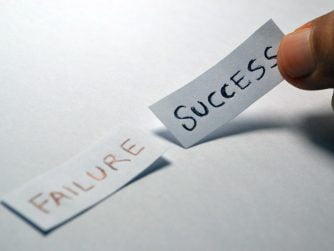Voice 1
Welcome to Spotlight. I’m Colin Lowther.
Voice 2
And I’m Liz Waid. Spotlight uses a special English method of broadcasting. It is easier for people to understand, no matter where in the world they live.
Click here to follow along with this program on YouTube.
Voice 1
It is January 2005. A man named Lawrence Summers was speaking at a conference. The conference was about women who work in science and engineering jobs. These kinds of jobs are called STEM jobs. STEM is the first letter of science, technology, engineering and math. It is a well-known fact that most of the people who work in STEM jobs are men.
Voice 2
At the time of the conference, Summers was president of the famous Harvard University. His words made a lot of people very angry. Summers claimed that men were more highly skilled in math and science. He said that people should consider that genetics could be the reason more men than women are in STEM work. Some people were so angry at this comment that they walked out of the conference! The next day, media around the world were talking about Lawrence Summers’ comments. It is true that fewer women than men have STEM work. But is genetics the reason? Could it be culture, or history? Are women able to be as good at STEM jobs as men? Today’s Spotlight is on women and STEM careers.
Voice 1
Almost every part of modern life involves technology and science. The global economy needs more and more people working in STEM jobs. The UN reports:
Voice 3
“New ideas and improvements in STEM are very important. They are able to help achieve long-term development and the end of poverty.”
Voice 2
The UN reports that in the area of engineering, men are the majority in almost every country. They also report low global percentages of women studying computer science. The Elsevier Foundation is an international organization that supports women in STEM jobs. The foundation did research in countries in some of the world’s largest economies. These included the US, Korea, India, and Europe. They found that less than 30% of women study STEM subjects. However, the problem is even more serious. In some countries, women are studying STEM subjects. But they do not take jobs in science, technology, engineering and math. Sophia Huyer is the Executive Director of the international organization Women in Global Science and Technology. She told the US News and World Report,
Voice 4
“Being able to get an education is not a solution all on its own.”
Voice 1
Women are half of the global work force. But less and less women are going into STEM jobs. Many different theories exist about why more men are in STEM careers. One of the most common is that women are less skilled in science, technology, engineering and math. Many people believe this. But Jo Boaler disagrees. Boaler is a math education professor at Stanford University. She told Stanford Press,
Voice 5
“There is a huge belief that boys are better at math. This does not agree with the information we have. And yet people believe it. You go into schools and the children will tell you that.”
Voice 2
People also think that women do not choose STEM careers because of marriage and children. They say that STEM jobs are more demanding and difficult for people with family responsibilities. Often STEM jobs involve big projects. Employers commonly expect workers to leave behind everything else until the project is finished – even if they have to work in the middle of the night. Lawrence Summers also talked about this in his comments about why fewer women work in STEM. He said,
Voice 6
“The best reason I can give is the general conflict between people’s family desires and employers’ desires for high power and high intensity.”
Voice 1
Also, many women say that they do not try to get STEM jobs because other people discourage them. Jennifer Selvidge is a student at Massachusetts Institute of Technology. This is one of the top schools for studying STEM subjects. She wrote in a Huffington Post blog,
Voice 7
“I am an engineer, an honours student, and a woman. People have also told me hundreds of times that I do not deserve to be where I am.”
Voice 2
Many people believe that it is not fair that women do not have an equal chance to work in STEM jobs. So people around the world are trying to get more women into STEM careers. One way is by celebrating the achievement and raising the recognition of women in STEM careers. For example, the Elsevier Awards are given out by the World Academy of Sciences, the Elsevier Foundation, and the Organization for Women in Science for the Developing World. These awards go to women in science from the developing world.
Voice 1
Eqbal Mohammed Abdu Dauqan is one Elsevier Award winner. Dauqan is from Yemen. She is the head of the medical laboratory science department at the Al-Saeed University in Taizz, Yemen. Dauqan told the Foundation,
Voice 8
“My father is in engineering. My mother is a house-wife. But she was pushing me to finish my studies. My older sister is a doctor in geographic science. One cousin is an engineer.”
Voice 2
Elsevier award winners come from all over the world. But one thing that many of them share is a strong system of support. The women scientists say that they have support from husbands, children, parents, and extended families. David Ruth is the Executive Director of the Elsevier Foundation. He told US News and World Report,
Voice 9
“You see a lot of women coming to get this award with their families. They have a support network. In parts of the world where gender is more of an issue, it takes more than one individual to be able to succeed.”
Voice 1
Women like Eqbal Mohammed Abdu Dauqan show that women can be very good at STEM careers. And more women are getting support from organizations like the Elsevier foundation. Hopefully this will result in more women in STEM jobs around the world. This would provide more equal employment for women. And it would help their families and communities.
Voice 2
But it would also help science and technology. Women often have a different viewpoint and experience than men. They bring important skills to the STEM subjects. Maybe, with more women in STEM jobs, these quickly growing areas would improve even more!
Voice 1
The writer of this program was Jen Hawkins. The producer was Michio Ozaki. The voices you heard were from the United States and the United Kingdom. All quotes were adapted and voiced by Spotlight. You can listen to this program again, and read it, on the internet at www.radioenglish.net. This program is called, “Women in STEM Jobs.”
Voice 2
Tell us what you think about today’s program. You can leave a comment on our website. Or email us at radio@radioenglish.net. And find us on Facebook – just search for Spotlight Radio. We hope you can join us again for the next Spotlight program. Goodbye!
Question:
Why do fewer women than men work in Science and Technology jobs?
More Programs You Might Like (Playlists):








In my opinion , that not fair not all women came from the same culture . Some of countries have a culture that didn’t give the women the opportunities to complete their studies . So we can’t generalize this outcome .
Boys and girls are equal in terms of the STEM skills, gender does not make a different. Also, lack of female leaders can also be barrier that women do not have a oppotunity to work in STEM jobs. If STEM workplaces changes awareness and give more support to women, I believe that we can see more women in STEM.
The only area in which men cannot fear competition from women is that of physical strength. In terms of intellectual strength, the contest is at high risk for men, even in scientific subjects and defeat is a very concrete possibility. Where instead there can be no challenge, due to the manifest superiority of women, it is in terms of physical beauty. Given the situation, the best thing to do would be to collaborate, as Valentine’s Day would suggest, in order to combine intelligence with strength and beauty.
In my view, I expect it depens on Family culture that some people are saying the science and technology are not appropriate for women, some family are not allowed to study woman in science and technology. Another reason the science and technology spend more hours in working and studying
Student
Thanks so such my Friends?. May THE LORD JEHOVAH SHALOM BLESS YOU!
In my opinion . That’s afear for a woman
That’s beautiful spotlight
Thanks
In my opinion , that not fair not all women came from the same culture . Some of countries have a culture that didn’t give the women the opportunities to complete their studies . So we can’t generalize this outcome
When I seek a medical care I notice that there are no female doctors in some fields of medicine, such as cardiology, orthopedics. To be honest, I do not trust female doctors. I feel they do not efficient as men. However, women are professional in other scientific areas like lab scinces and research.
My opinion is that it depends on the environment in which the person lives, but my point of view is that I prefer that it is male jobs that require high physical and mental effort
Because almost all the directors of STEM think that womens are less inteligent.
But that is not my opinion.
I am happy
right